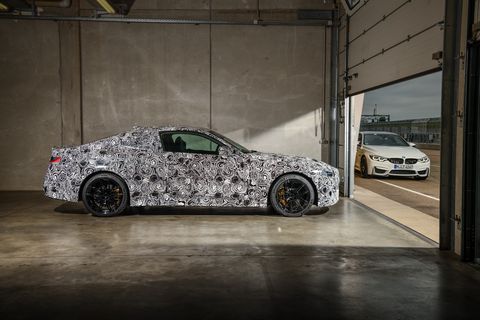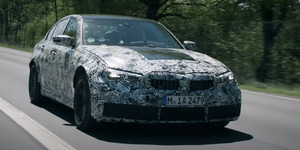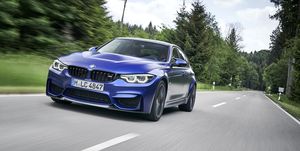Electrification will be a big change for the M division of BMW, and if the most radical predictions come true, driving will be very different in 10 years. Count us among the skeptical, but if we are wrong, the new BMW M3 and M4, which we just drove in prototype form, may indeed be the last of their kind.
Powered by BMW’s S58 twin-turbo 3.0-liter inline-six, an engine introduced in the X3 M and X4 M, the next-generation M3 and M4 will initially be offered in two forms, both of them rear-wheel drive. Entry-level versions will have 473 horsepower and a six-speed manual gearbox, while the Competition model will get an extra 30 horsepower, possibly to make up for the extra weight of the mandatory ZF-sourced eight-speed automatic transmission.
Down the road, the M3 and M4 Competition models will be available with an optional all-wheel-drive system, and even further on, we wouldn’t be surprised to see more limited editions, just like in the past.
The straight-six is incredibly rev happy, considering it is force-fed by two turbochargers, and it still emits the sweet, silky sound that we love about this type of engine. In the case of the M3 and the M4, it is of course amplified by a performance exhaust system with four fat tailpipes.
After driving a manual-transmission M3 back to back with a previous-generation M4, we can say with some confidence that BMW has made a very good thing even better. The steering, uniquely engineered for the M models, is extremely precise, turn-in is ultra agile, and it is easy to coax the M3 into a drift. The enthusiasm of the rear end can be pre-selected by the stability control system from full on to full off. You can choose to have your drifts swiftly curtailed, allow them to progress to an exciting angle, or donuts, donuts, donuts.
All M3 and M4 models will have staggered and different wheel diameters front and rear. Beyond the base 275/40R-18 front and 285/35R-19 rear combination, there will be an optional 275/35R-19 front and 285/30R-20 rear setup.
As with every modern M car, there are settings galore. At long last, you can shut off the rev-match system no matter what driving mode you’re in. We’d rather blip the throttle ourselves, especially with such a slick clutch and shifter combo. The cockpit is taken straight from the regular 3- and 4-series, with a few M-specific graphics and, as before, extra buttons that allow you to shortcut directly to your preferred, pre-configurable settings. In the prototypes, we preferred the low-effort steering setting, a medium suspension setting, and an aggressive powertrain setting with the stability control system in Sport and rev match disabled, thank you very much. However, when we are in the mood, we may opt for the loud exhaust setting. The fat steering wheel offers great grip, and the seats offer plenty of support in fast corners.
While the prototypes were still masked with tape and cladding, the much wider front and rear track is clearly visible and serves to distinguish these models from the regular 3- and 4-series upon which they are based. Both the M3 and the M4 will likely wear an even larger kidney grille than the regular-grade 4-series. Online forums will be set ablaze, but we expect BMW fans to eventually make peace with the new look.
While BMW isn’t ready to make any performance claims, we expect its zero-to-60-mph performance to be under four seconds, and the top speed will be limited to 155 mph or 180 mph, depending on the configuration.
Entry-level pricing is expected to stay around $70,000 for starters, and the car will likely come to market at the beginning of 2021. The new M3 and M4 will continue to compete with the Alfa Romeo Giulia Quadrifoglio, Mercedes-AMG C63, Audi RS5, and Lexus RC F. Thankfully, in this highly competitive class, the BMW remains the only car with a manual gearbox.
This content is created and maintained by a third party, and imported onto this page to help users provide their email addresses. You may be able to find more information about this and similar content at piano.io









